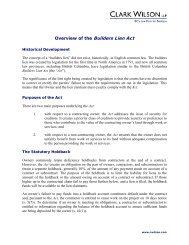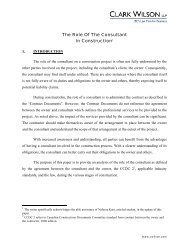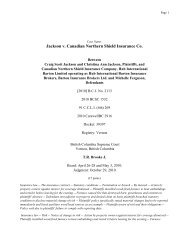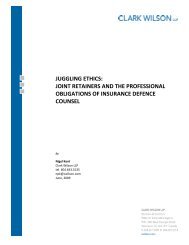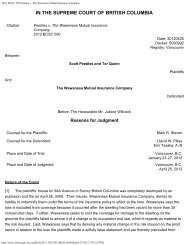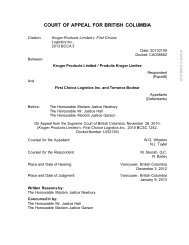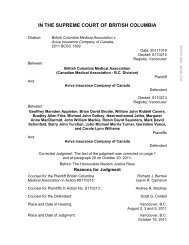AN OVERVIEW OF CONSTRUCTION CLAIMS: - Clark Wilson LLP
AN OVERVIEW OF CONSTRUCTION CLAIMS: - Clark Wilson LLP
AN OVERVIEW OF CONSTRUCTION CLAIMS: - Clark Wilson LLP
You also want an ePaper? Increase the reach of your titles
YUMPU automatically turns print PDFs into web optimized ePapers that Google loves.
p. 20<br />
5. Government Entities<br />
Most standard form construction contracts do not have detailed scheduling clauses. The CCDC<br />
2 – 1994 is fairly standard in terms of its requirement for the contractor to submit a progress<br />
schedule shortly after the contract award and for the required updates to the schedule.<br />
Some government agencies have included more detailed and sophisticated scheduling<br />
requirements in their construction contracts to deal with their particular circumstances, such as<br />
the following:<br />
(a)<br />
(b)<br />
(c)<br />
(d)<br />
(e)<br />
A preliminary network diagram indicating work activities for the first 60 days;<br />
A detailed network diagram depicting the order, interdependence, and sequence of<br />
construction, procurement and submission activities and showing, for example,<br />
milestones, government activities affecting progress, activity durations of 30 days<br />
maximum, and differentiation of construction areas;<br />
Time-scaled summary network diagrams;<br />
A detailed activity report including activity identification numbers, description,<br />
duration, early / late start and finish dates, manpower, float, and dollar value;<br />
Detailed updating requirements;<br />
(f) Requiring contractors to maintain their own CPM 37 schedules during<br />
construction; and<br />
(g)<br />
Requiring only the contractor to report data in a form that would allow the owner<br />
to monitor the contractor’s work through a network schedule.<br />
6. Delay And Failure To Schedule And Coordinate<br />
Failure to properly schedule and coordinate a project results in disorganization and disruptions<br />
which often lead to delay claims. As such, ensuring proper schedules is key to any project.<br />
Schedules are an important part of proving or refuting delay and other impact claims because<br />
they provide a detailed medium for comparing and measuring time and intent. The use of a<br />
detailed method to present a time claim is important to carry the claimant’s burden of proof for<br />
its entitlement to both delay and other additional costs a delay may have caused. In the United<br />
States and other countries, schedules are increasingly used to prove a delay. Schedules are thus<br />
important not only to avoid delay, but for evidence to be used in any delay claim.<br />
36<br />
37<br />
GC 3.8.5 of the CCDC 2 - 1994.<br />
CPM means critical path method.<br />
© 2005 <strong>Clark</strong> <strong>Wilson</strong> <strong>LLP</strong> www.cwilson.com<br />
Samantha Ip, T. 604.643.3172




